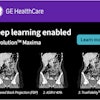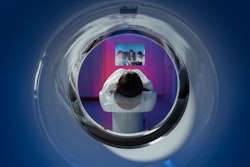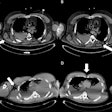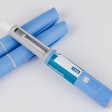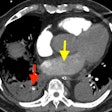CT reveals that functional limitations after sports-related traumatic brain injury (TBI) -- even mild impacts -- can persist for six months or more, researchers have reported.
A team led by Michail Ntikas, PhD, of the University of Stirling in Scotland, found that 31% of patients with seemingly minor injuries and negative results on CT showed persistent functional limitations after TBI at six-month follow-up. Ntikas' and colleagues' research was published on 24 January in JAMA Network Open.
"[Our] findings caution against taking an overoptimistic view of outcomes after sports-related TBI, even if the initial injury appears mild," the group noted.
The risk of TBI during participation in sports raises significant concern among clinicians, particularly regarding long-term effects, the investigators explained. And although there have been many studies examining concussion in sports, little is known about individuals who present at the hospital with a TBI incurred during sport-related activities, corresponding author Lindsay Wilson, PhD, told AuntMinnie.com via email.
"It is usually thought that people with sport-related TBI will have good outcomes, particularly if they have an injury that is classified as ‘mild’ (Glasgow Coma Score of 13 to 15)," he said. "But [these patients] have never been compared [to those with non-sport-related TBI] on a range of different outcomes."
To address the knowledge gap, Ntikas and colleagues compared the characteristics and outcomes of patients with sports-induced TBI and non-sports-induced TBI. They used data from the Collaborative European NeuroTrauma Effectiveness Research in TBI (CENTER-TBI) study, which was conducted at hospitals in 18 countries between December 2014 and December 2017. The team's research included 4,360 patients (all of whom were 16 or older) who had TBI and thus an indication for head CT. Of the 4,360 patients, 256 (6%) had sports-related head injury and 4,104 (94%) had non-sports-related injury. The mean age of the sport-related head injury patients was 39, and the mean age for those patients with non-sports-related TBI was 51.
The researchers evaluated patient outcomes at three and six months postinjury. Patients were categorized into subgroups by severity of injury. The study's main outcome was the Glasgow Outcome Scale-Extended (GOSE) at six months after injury, while secondary outcomes included postconcussion symptoms and health-related quality of life and mental health assessments. (The GOSE scale is an 8-point measure for assessing TBI, with a score of 1 being death and a score of 8 categorized as "upper good recovery.")
They found that both groups of patients did not differ in functional "incomplete recovery" (that is, GOSE scores of less than 8) at six months follow-up, with an odds ratio of 1.27 (reference, 1) for all patients.
In fact, Ntikas and colleagues noted the following percentages of incomplete recovery among the group of sports-related TBI patients at six-month follow-up:
- 46% of patients in the overall sports-related injury group
- 39% of those with mild sports-related TBI
- 31% of those with mild sports-related TBI and negative CT findings
"There was no significant difference in functional outcomes, and even in individuals with mild sports-related TBI and negative imaging findings," they wrote.
The study stresses the importance of continued tracking of patients with TBI caused by sport participation, according to the authors.
"The findings highlight the need for effective clinical follow-up and support for patients who present to hospitals after sports-related TBI irrespective of severity of injury," they concluded.
The work also contributes to the understanding of TBI, wrote Gavin Sanders, PhD, and C. Munro Cullum, PhD, both of the University of Texas Southwestern Medical Center in Dallas, in an accompanying commentary.
"The article by Ntikas et al is timely and addresses an important topic, because a subgroup of those who experience [mild TBI] continue to report lingering symptoms beyond the typical recovery window, yet this subgroup and their symptoms remain poorly understood," they wrote.
The complete study can be found here.


